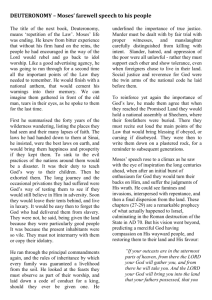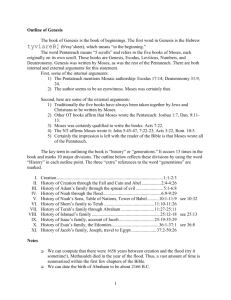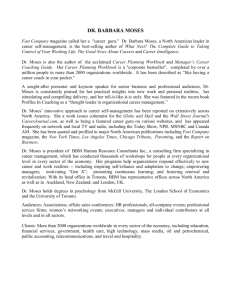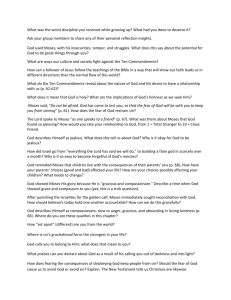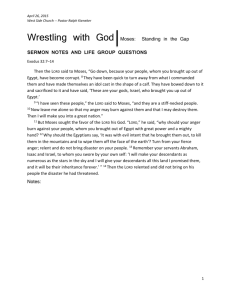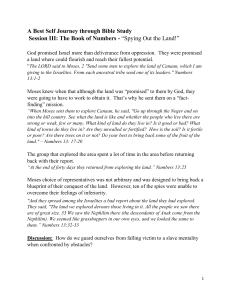File - FWC Apologetic Ministries
advertisement
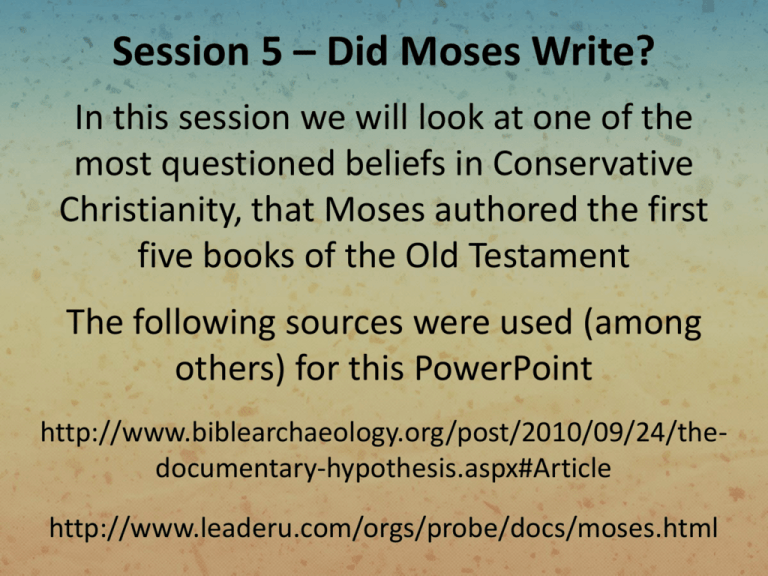
Session 5 – Did Moses Write? In this session we will look at one of the most questioned beliefs in Conservative Christianity, that Moses authored the first five books of the Old Testament The following sources were used (among others) for this PowerPoint http://www.biblearchaeology.org/post/2010/09/24/thedocumentary-hypothesis.aspx#Article http://www.leaderu.com/orgs/probe/docs/moses.html As Christians we were all taught that Moses wrote the first five books of the Old Testament (Genesis, Exodus, Leviticus, Numbers, and Deuteronomy) This view has come under heavy fire in recent days, and outside of conservative evangelical circles, the view is that Moses did not write those books The Documentary Hypothesis The dominating view in the minds of secular historians (and many Christians now today) is what’s known as the Documentary Hypothesis (or J.E.P.D. theory, or GrafWellhausen theory) This theory says that the first five books of the Old Testament were written long after the life of Moses, and were compiled into what we have today even later than that It proposes that these writings can be split into atleast four different groups (associated with certain times) and were meshed together around the time of Ezra and Nehemiah into what we have today According to this view, the letter "J" stands for the Yahwist ("J" from the German Jahweh) narrative, coming from the period of the early Jewish monarchy, about 950 B.C. (around 500 years after Moses) "E" stands for the Elohist narrative from the region of the Northern Kingdom dating from about 750 B.C. "D" is best represented by the book of Deuteronomy and is said to have originated in the Southern Kingdom of Israel around 650 B.C. or later. "P" is the priestly document that comes from the period after the fall of Israel in 587 B.C. It wasn’t until recently (in the grand scale of things) that people started questioning Moses as the author Jewish Historians, the Bible itself, and the early church seemed solid on the idea that Moses was the author People understood though that there were a few difficulties, like the death of Moses being recorded in Deuteronomy, how does that work if he wrote the book? Origins of the theory Ibn Ezra was a Jewish rabbi in the 12th Century, who (we think) believed Moses was the author of the Pentateuch, but noticed a few phrases that confused him when looking at parts of Genesis About five centuries later, Jewish philosopher Baruch Spinoza picked up on Ibn Ezra’ work and argued that Ezra rejected Mosaic authorship (debated at the time) Spinoza was later excommunicated from the Jewish Community (and denounced by Christians) for his pantheistic beliefs More attacks on Mosaic authorship came later on in France after Jean Astruc published his book on the topic in 1753 Astruc was on the side of Mosaic authorship, but his work was used to support the attacks on Mosaic author Astruc questioned, like others had, how Moses knew what happened prior to his life How did he have that information for the book of Genesis, creation, flood, Abraham, Isaac, Jacob, etc. He noticed that Elohim was the name for God in Genesis 1:1-2:3, but then the text switches after that and uses the name Yahweh (Jehovah) in chapter 2 Astruc claimed these name changes shows that Moses was using multiple sources when he was compiling Genesis Astruc thought that Genesis 1:1–2:3 was one creation account and Genesis 2:4–24 was a different creation account. Because of that we have Elohim and Jehovah sections (or E and J documents) originate at that time Johann Eichhorn took the next step by applying the ideas of Astruc to the whole book of Genesis At first, in his 1780 Introduction to the Old Testament, Eichhorn proposed that Moses copied previous texts, in later editions he decided that J-E division can be applied to the entire Pentateuch, which he said was written after the time of Moses It didn’t end there In 1802, Johann Vater said that Genesis was compiled from 39 (or more) fragments In 1805, Wilhelm De Wette said that nothing in the Pentateuch was written before the time of King David and that Deuteronomy was written around the time of King Josiah (Hence the D document) Later on it was proposed Leviticus and some other portions were work of Jewish priests (hence the P-Document) The most popular view held today was originated by Julius Wellhausen which was proposed in 1895 He not only had the four sources (J. E. P. D.) but put dates to them Gleason Archer said, "Although Wellhausen contributed no innovations to speak of, he restated the documentary theory with great skill and persuasiveness, supporting the JEDP sequence upon an evolutionary basis." Here’s an example where they really break down the text in Genesis Oswald T. Allis breaks down the beginning of Genesis in his book this way: J 5:29 P 5:1-28 Text of Genesis v. 28, "And Lamech lived one hundred and eightytwo years, and became the father of a son." v. 29, "Now he called his name Noah, saying, 'This one shall give us rest from our work and from the toil of our hands arising from the ground which the Lord has cursed.'" 5:30-32 v. 30, "Then Lamech lived five hundred and ninetyfive years after he became the father of Noah, and he had other sons and daughters." 6:1-8 6:9-22 7:1-5 7:6 7:7-10 7:11 v. 5, "And Noah did according to all that the Lord had commanded him." v. 6, "Now Noah was six hundred years old when the flood of water came upon the earth." v. 7, "Then Noah and his sons and his wife and his sons' wives with him entered the ark because of the water of the flood." v. 11, "In the six hundredth year of Noah's life, in the second month, on the seventeenth day of the month, on the same day all the fountains of the great deep burst open, and the floodgates of the sky were opened." The theory does not do this detailed of cutting to the entire five books But Genesis 1-7 is cut into these tiny pieces that are then attributed to different authors (sometimes sentences are cut in half and attributed to different people) What is the evidence for the documentary hypothesis? Why do so many people believe that Moses did not write? Foundational Assumptions to the Theory 1. An evolutionary, unilinear approach to Israelite history 2. The possibility of dividing the Pentateuchal texts on the basis of stylistic criteria 3. A simple joining or fusing (conflation) of documents by redactors 4. Easily determine the purposes and methods behind the documents and redactions: In reference to this last point, Duane A. Garrett explains: “The early framers of the Documentary Hypothesis thought they could deduce the purposes and methods of the redactors, despite the fact that enormous cultural differences existed between the scholars who studied Genesis and the men who wrote it. More than that, scholars came to have strange perceptions of the writers of the documents over against the redactors. In particular, it was assumed that each writer aimed to produce a single, continuous history but would tolerate no inconsistency, repetition, or narrative digressions. The redactors, on the other hand, were said to be utterly oblivious to every kind of contradiction and repetition.” These four points were (and are still today) foundational to the development of the documentary hypothesis The evidence offered 1. Text using different names for God As mentioned earlier, in the beginning of Genesis, some text use Elohim for God’s name while others use YHWH Rebuttal: This standard is not consistent. Genesis 22:11, an E text, uses the name Yahweh (when it should only be using the name Elohim for God) In Genesis 2-4 (J source) we see the names YHWH and Elohim used together Genesis 2:4: “These are the generations of the heavens and the earth when they were created, in the day that the LORD (YHWH) God (Elohim) made the earth and the heavens.” Outside Genesis, M.H. Segal notes that those names for God are used interchangeably in texts that cannot have different athors The idea that the writers of E and P texts avoided using the name YHWH until the time of Moses in their writings is unnecessary There would be no reason why they couldn’t use the name unless they were quoting a patriarch who wouldn’t have used that name There are several reasons why Moses may have used these different names for God in different verses The different names describe different attributes of God According to some theologians, Elohim is used to refer to God as a universal God, over all creation (Example: Genesis 1) While YHWH speaks more to God as a covenant savior Moses may also use it for variety, while others think he interchanges them unconsciously as he is writing 2. Genesis contains some duplicate stories and repetitions One example would be Genesis 12:10–20 (Abraham goes to Pharaohs house) and 20:1–18 (he goes to Abimelech’s house) Many readers today would see these two stories as being the same story, with a few differences which can be attributed to the story being handed down in different communities over time (it changes a little) Rebuttal: The idea that similar stories or structures in telling stories means different authors is a modern perception Duane A. Garrett: “In an ancient text, there is no stronger indication that only a single document is present than parallel accounts. Doublets, that is, two separate stories that closely parallel one another, are the very stuff of ancient narrative. They are what the discriminating audience sought in a story.” This type of repetition, or similar accounts is common in ancient Near Eastern literature The Bible uses this method quite often In Genesis 24, the Bible tells us how Abraham’s servant prayed for guidance and then meets the future wife of Isaac at a well (Gen 24:12–27). It then gives the servant’s account of all this to Laban, but it quotes almost verbatim the previous material In the New Testament book of Acts a have three complete accounts of Paul’s vision on the way to Damascus (9:1–19; 22:3–16; 26:9–18). At the time Moses was writing, if you had two accounts similar to each other, it was normal to give them in the same format In the Book of Kings, it summarizes the reigns of each king of Israel and Judah, and tends to employ a number of formulas. Often times when we have repetitious accounts in the Bible, the second account goes on to explain things in more detail Some point to the example of Genesis 1:1 compared to the rest of chapter 1 Another example would be the creation events on day six (Genesis 1:24-31) and then given in more detail in Genesis 2:4-24 It’s not evidence for different authors 3. The different styles in writing Rebuttal: It’s not hard to explain the different writing styles when they do appear, and it’s important to note that even within the different J. E. P. D. documents, different styles exist Moses did not sit down and write the whole thing at once, he wrote at different times for different reasons, and the writing style of an individual can develop over time A detailed linguistic study was done by Radday and Haim, in their book “Genesis: An Authorship Study” They concluded: “All these reservations notwithstanding, and with all due respect to the illustrious Documentarians past and present, there is massive evidence that the pre-Biblical triplicity [i.e., of J, E, and P] of Genesis, which their line of thought postulates to have been worked over by a late and gifted editor into a trinity, is actually a unity” Other “evidences” do exist for the theory, but we only have time to deal with the most popular ones you’ll see One more question that needs answering if Moses is the author Deuteronomy 34:4-6: “And the LORD said to him, “This is the land of which I swore to Abraham, to Isaac, and to Jacob, ‘I will give it to your offspring.’ I have let you see it with your eyes, but you shall not go over there… So Moses the servant of the LORD died there in the land of Moab, according to the word of the LORD, 6 and he buried him in the valley in the land of Moab opposite Beth-peor; but no one knows the place of his burial to this day.” Who’s writing this? It can’t be Moses One explanation is that the division in chapters is off here, and that originally chapter 34 of Deuteronomy was the first Chapter of Joshua (the following book) Another view says that it’s where it’s supposed to be in the book of Deuteronomy, and just because someone wrote the end to the life of Moses doesn’t mean the previous 33 chapters were written by someone else It’s not uncommon for the death of a writer to be recorded by someone else at the end of his work The most popular view would be that Joshua was the one who recorded his death What does the Bible say about all this? The Old Testament attributes the writings to Moses in multiple places Bear with me, we want to make a point here and will read quite a few verses Exodus 17:14: “Then the LORD said to Moses, "Write this for a memorial in the book and recount it in the hearing of Joshua, that I will utterly blot out the remembrance of Amalek from under heaven." Numbers 33:2: “Now Moses wrote down the starting points of their journeys at the command of the LORD. And these are their journeys according to their starting points:” Joshua 8:31: “As Moses the servant of the LORD had commanded the children of Israel, as it is written in the Book of the Law of Moses: "an altar of whole stones over which no man has wielded an iron tool." And they offered on it burnt offerings to the LORD, and sacrificed peace offerings. ”(see Exodus 20:24–25) Joshua 23:6: “Therefore be very courageous to keep and to do all that is written in the Book of the Law of Moses, lest you turn aside from it to the right hand or to the left.” 1 Kings 2:3: “And keep the charge of the LORD your God: to walk in His ways, to keep His statutes, His commandments, His judgments, and His testimonies, as it is written in the Law of Moses, that you may prosper in all that you do and wherever you turn.” Daniel 9:11: “Yes, all Israel has transgressed Your law, and has departed so as not to obey Your voice; therefore the curse and the oath written in the Law of Moses the servant of God have been poured out on us, because we have sinned against Him.” See also: Joshua 1:7–8, 2 Kings 14:6, 1 Chronicles 22:13, Ezra 6:18, Nehemiah 13:1, Malachi 4:4 That’s just the OT passages The Old Testament attributes the writings to Moses in multiple places Mark 12:26: “But concerning the dead, that they rise, have you not read in the book of Moses, in the burning bush passage, how God spoke to him, saying, "I am the God of Abraham, the God of Isaac, and the God of Jacob"? (see Exodus 3:6) John 5:46: “For if you believed Moses, you would believe Me; for he wrote about Me.” Luke 24:27: “And beginning at Moses and all the Prophets, He expounded to them in all the Scriptures the things concerning Himself.” Acts 3:22: “For Moses truly said to the fathers, 'The LORD your God will raise up for you a Prophet like me from your brethren. Him you shall hear in all things, whatever He says to you.” (see Deuteronomy 18:15) Romans 10:5: “For Moses writes about the righteousness which is of the law, "The man who does those things shall live by them." (see Leviticus 18:1–5) Romans 10:19: “But I say, did Israel not know? First Moses says: "I will provoke you to jealousy by those who are not a nation, I will move you to anger by a foolish nation." (see Deuteronomy 32:21) 2 Cor 3:15: “But even to this day, when Moses is read, a veil lies on their heart.” See also: Matthew 8:4, Luke 16:29, Luke 24:44, John 7:22, Acts 15:1, Acts 28:23, 1 Corinthians 9:9 The witness of scripture is rather overwhelming that Moses wrote those books in the Bible, if you believe in Biblical inerrancy, it’s not that hard to figure out There is no good reason to reject Moses as the author of these five books The Biblical witness is clear that Moses is the author, nothing in history goes against that As Gleason Archer states, "For want of a better theory . . . most non-conservative institutions continue to teach the Wellhausian theory, at least in its general outlines, as if nothing had happened in Old Testament scholarship since the year 1880." Memory Verse John 5:46: “For if you believed Moses, you would believe Me; for he wrote about Me.”
